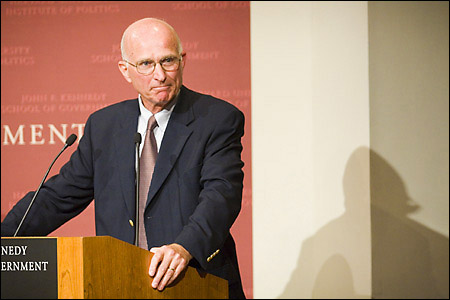Accomplish mission or withdraw
Experts debate bringing the troops home
Pulling U.S. troops out of Iraq may be the impetus Iraqis need to set aside their differences and their arms to join together for the good of their country – or it may spark a bloodbath targeting those who cooperated with American forces in hopes of establishing democratic government.
Those were the opposing views espoused by two authorities on the Iraq situation who took the stage at the John F. Kennedy School of Government Oct. 12 for the latest debate on the future of Iraq.
The event, titled “Iraq: Accomplish Mission or Withdraw?”, was sponsored by the Institute of Politics and the Government Department’s Program on Constitutional Government. It featured Victor Davis Hanson, a senior fellow of the Hoover Institution at Stanford University and Lawrence Korb, a senior fellow at the Center for American Progress and assistant secretary of defense under Ronald Reagan from 1981 to 1985.

Tad Oelstrom, director of the Kennedy School’s National Security Program and a retired lieutenant general in the U.S. Air Force, moderated the debate. In his introduction, Oelstrom said that the future of Iraq is an issue the Kennedy School has examined several times in the past. The changing situation there and globally, however, makes it an issue that bears continued scrutiny.
In the international arena, the Israel-Hezbollah strife occurred over the summer, tensions have increased over Iran’s nuclear program, North Korea has tested nuclear weapons and, in Afghanistan, the Taliban has renewed its attacks on the U.S.-supported government there. All this is occurring against the backdrop of U.S. midterm elections in which the Iraq War and security issues have loomed large.
Hanson and Korb agreed that whatever the reason we invaded Iraq, the United States has incurred a moral obligation to ensure the nation has a stable government before completely disengaging.
They differed in their assessments of the situation in Iraq and in how to accomplish that, however.
Hanson said that the United States must stay to continue to support and train Iraqi security forces until they can handle the nation’s security on their own and until the new Iraqi government is stable.
Korb, however, said that may never happen if we keep the current level of forces in Iraq. Korb said that, although he shares Hanson’s aim of a stable Iraqi government, keeping U.S. troops there is hindering rather than helping that process.
U.S. forces are both acting as a crutch for the current government and as a target in what he called a “civil war” there. Without U.S. troops, Korb said, the Iraqis would be forced to find a middle ground to bridge their differences.
“When you look at the situation in Iraq, it’s important to remember you don’t have any good options,” Korb said.
Korb said that neither the U.S. public nor Congress would have approved of the Iraq War if they’d known how high – in dollars and lives – the cost would be. Further, he said, Congress wouldn’t have supported the venture if members had known there were no threat of weapons of mass destruction and no link to al-Qaeda terrorists.
Still, now that we’re there, Korb said, we have an obligation not to just pull out and leave the Iraqis to whatever fate befalls them. He’d pull forces to existing bases in the region and to a carrier battle group in the nearby seas.
Reducing the forces in Iraq, which he termed a “strategic redeployment” would not only give Iraqis incentives to settle their disputes, he said it would ease the pressure on an overstretched military and free up resources for rebuilding in Iraq.
Hanson countered by asserting that Congress decided to go into Iraq for many reasons besides the threat of weapons of mass destruction (over 20, he said), and reminded the audience that, whether or not he had direct links to al-Qaeda, Saddam had both harbored terrorists and sponsored acts of terrorism against the West. Just because the cost of the war is growing, Hanson added, doesn’t mean the mission was wrong. There have been higher costs than expected in other wars, but that doesn’t mean the wars themselves were wrong. Hanson said the security situation and the ability of Iraqis to handle security themselves is way ahead of where it was in Vietnam even after 10 years of U.S. involvement.
“We owe the Iraqis a little bit more time,” Hanson said. “A precipitous withdrawal wouldn’t be the moral thing to do, it would be the amoral thing to do.”
In response to questions, Hanson and Korb agreed, however, that increasing troops would be impossible, completely aside from whether or not it would help the situation in Iraq. Politically, the American public wouldn’t support a dramatic increase in troop numbers, and European nations are equally unlikely to support an increase of their troops.
Related links:
- Looking at Germany, Japan, Iraq: A tale of three occupations U.S. ‘occupations’ compared by panel
- Reconstruction of Iraq holds key to future terrorism fight
- Qazir says Iraq’s future potentially bright: UN envoy opens development converence




